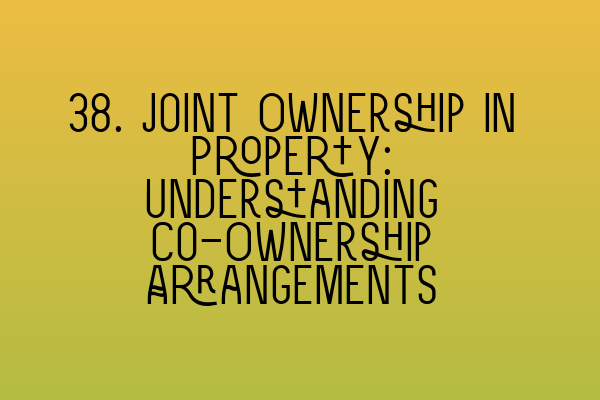38. Joint Ownership in Property: Understanding Co-Ownership Arrangements
When it comes to buying property, joint ownership arrangements are quite common. Whether you’re considering purchasing a property with a partner, family member, or even a friend, it’s important to understand the different types of co-ownership arrangements available to you. In this article, we will explore the various forms of joint ownership in property and provide insight into the legal implications of each.
1. Tenancy in Common
Tenancy in common is a popular form of joint ownership, especially among individuals who wish to own unequal shares in a property. Under this arrangement, each co-owner has a distinct, identifiable share in the property. For instance, one co-owner may hold a 70% share, while the other holds a 30% share. The shares can be transferred or inherited, allowing for flexibility in ownership arrangements.
In a tenancy in common, each co-owner has the right to sell or mortgage their share without the approval of the other co-owners. It’s crucial to have a clear understanding of the specific terms and conditions of the tenancy in common agreement to avoid any disputes or conflicts in the future.
2. Joint Tenancy
Joint tenancy is another common form of co-ownership, often used by married or civil partnership couples. In a joint tenancy, each co-owner has an equal, undivided share in the property. Unlike tenancy in common, joint tenants do not have distinct shares and are considered to have a single ownership interest collectively.
One significant feature of joint tenancy is the right of survivorship. This means that if one co-owner passes away, their share automatically passes to the surviving co-owners, regardless of any conflicting provisions in a will. It’s important to note that joint tenancy can only exist between two or more individuals who have equal ownership stakes.
3. Partnership Co-Ownership
Partnership co-ownership is commonly used by business partners who jointly own a property for commercial purposes. This form of co-ownership allows the partners to share the profits and losses from the property in proportion to their agreed-upon ownership shares.
It’s crucial to have a well-drafted partnership agreement that outlines the responsibilities, obligations, and decision-making processes to avoid disagreements and potential litigation down the line. An experienced property law solicitor can assist in preparing a comprehensive partnership agreement that protects the interests of all parties involved.
4. Limited Liability Partnership (LLP)
In certain situations, such as property development projects, a joint ownership structure known as a limited liability partnership (LLP) may be utilized. This arrangement combines elements of both partnership co-ownership and the benefits of limited liability typically associated with a company.
An LLP provides the co-owners with some protection against personal liability for the partnership’s debts or actions. This structure may be particularly advantageous when dealing with large-scale property investments or development schemes.
Understanding the different types of joint ownership arrangements allows you to make informed decisions when entering into co-ownership agreements. Seeking professional legal advice from a property law solicitor is crucial to ensure that your rights and interests are protected throughout the process.
At SQE Property Law & Land Law, we have a team of experienced solicitors who specialize in property law and can provide the guidance and expertise you need. Contact us today to schedule a consultation and discuss your specific co-ownership requirements.
For more useful information about property law and the SQE exams, be sure to check out our related articles:
– SQE 1 Practice Exam Questions
– SQE 1 Practice Mocks FLK1 FLK2
– SQE 2 Preparation Courses
– SQE 1 Preparation Courses
– SRA SQE Exam Dates
Our team at SQE Property Law & Land Law is dedicated to helping our clients navigate the complexities of property ownership and co-ownership arrangements. Trust us to provide you with comprehensive legal advice and support for all your property-related endeavors.
